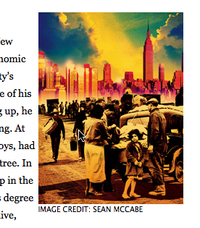 Given that President Obama is addressing Congress and the nation regarding economic concerns, two recent magazine articles were highly relevant. In The Atlantic, Richard Florida examines how the economic catastrophe will reshape america. Florida, a vocal proponent of cities as engines of progress, weighs potential regional survivors and victims in the wake of the financial meltdown.
Given that President Obama is addressing Congress and the nation regarding economic concerns, two recent magazine articles were highly relevant. In The Atlantic, Richard Florida examines how the economic catastrophe will reshape america. Florida, a vocal proponent of cities as engines of progress, weighs potential regional survivors and victims in the wake of the financial meltdown.
His overall argument is that certain city cores are better equipped to deal with the downturn as opposed to exurbs and rural areas. Excess talent, creativity, and tendency towards reinvention can prime the pump for clawing out of the trough. Counterintuitively, he argues that New York will turn out all right, despite the collapse of the financier lifestyle. First, the transferrence of financial might happens on a glacial pace. Second, the throngs of creative types from the artistic, literary, entertainment and fashion industries can step up to drive the city. Other urban areas like San Francisco, Seattle, and Boston have much higher concentrations of residents with high levels of education. Finally, a number of Sun Belt cities that have exploited globalization to expand into manufacturing, may outlast the downturn without much damage.
The big losers? Traditional mid-western Rust Belt cities that haven’t been able to retool ala Pittsburgh. Detroit is the poster child, with St. Louis, Buffalo, and Cleveland teed up for similar dire straits. And of course there’s sunny locales of Phoenix and anywhere in Florida, excepting Miami which will continue to serve as an access hub to Latin America.
Florida is where George Packer’s New Yorker article The Ponzi State goes to ground on the mess that is the Florida real estate market, and how so much of Florida’s economy depended on limitless growth. The article is too long for me to summarize, but Packer does a great job at detailing a cross-section of the social strata in Florida, how the crash poignantly affects them, and the very real interconnectedness of this disaster. Paraphrasing one of the resident’s musings (and Pogo), “We has met the enemy, and he is us.”
Obviously the truth of this mess is a complex and many splendored thing, but these two articles provided me context going forward.